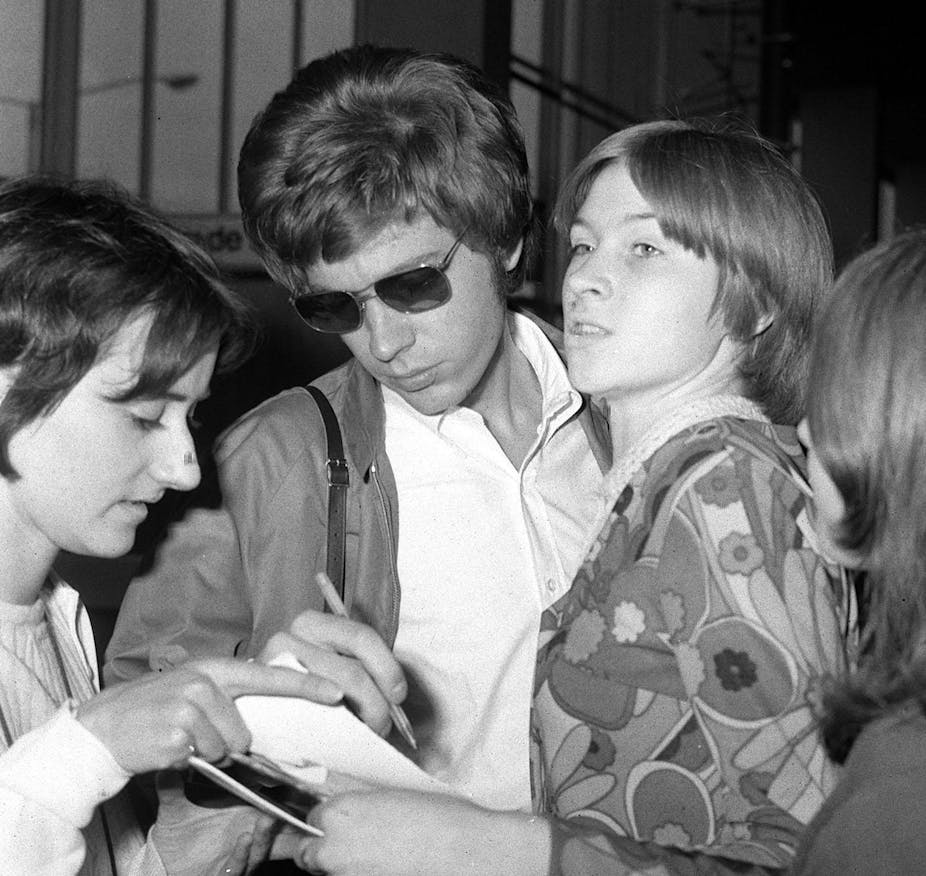Scott Walker, who has died aged 76, represented that rarest of entities: the intellectual pop star who garnered critical acclaim as well as commercial success; the avant-garde composer with hits; and a musician who demolished the idea of an unbridgeable divide between low and high culture.
Walker’s death marks an end to an unparalleled music career spanning teen-idol stardom and avant-garde experimentalism. Reaction to the news came from all corners of the musical world. Thom Yorke and Marc Almond were just two of many voices to be heard praising a musician who managed to traverse so many lines and boundaries. The harrowing imagery of Walker’s lyrics on songs such as The Electrician or Jesse would parallel Radiohead’s often unusual subject matter on the likes of Myxomatosis.
Very few artists have achieved the commercial success of Walker and also achieved enormous acclaim from critics – and none had his voice. Midge Ure referred to Walker as “the man with the mahogany voice” in a tribute tweet this week. Bowie comparisons are clear, but Walker’s late work pushed further and harder than Bowie’s in its dark experimentation. There was a friendship between the two – and Bowie famously covered Walker’s groundbreaking track Nite Flights on his 1993 album Black Tie White Noise. Sadly, neither remain with us beyond the recorded medium and the world is poorer as a result.
Born Noel Scott Engel in 1943 Ohio, Walker came to prominence in the late 1960s as part of the Walker Brothers, a group whose orchestral pop had particular success in UK. He remained in England, becoming a British citizen in 1970. Commercial hits such as Make it Easy on Yourself (UK number one in August 1965, number 12 in the US) and The Sun Ain’t Gonna Shine Anymore (number three in the UK in 1966) made Walker a household name and earned him his own television series in 1969.
But by the end of the 1960s, Walker chose to go solo – embarking on the first of four landmark records: Scott 1, 2, 3 and 4 (1967-9). These albums would earn him a reputation for baroque pop with tracks such as the Ingmar Bergman-inspired The Seventh Seal. Other key influences were the French songs of Jacques Brel and the Beat poets.
Avant garde
Early premonitions of his later experimentalism are displayed in songs such as It’s Raining Today on Scott 3. Here, the silky baritone delivery is combined with a dissonant string drone reminiscent of contemporary composer György Ligeti’s microtonal clusters so effectively employed by Kubrick in 2001: A Space Odyssey (1968). Such a composition – Ligeti’s Atmosphéres (1961) – and those of fellow composer Iannis Xenakis echo Walker’s later concern with sound blocks, a method of compositional procedure that juxtaposes textures in a foregrounded avant-garde fashion. The song Boy Child further exemplified a new minimal approach to songwriting on Scott 4, as Walker moved beyond earlier Bacharach-esque arrangements.
The Walker Brothers would reunite for a period in the 1970s. Lines (1976) and Nite Flights (1978) were moderate successes financially but, more importantly, Walker’s contributions to the latter document his evolution into the avant-garde composer he was to become on Tilt (1995).
Label difficulties and creative differences resulted in a fallow, uninspired period in the 1980s – what Walker referred to as his “lost years” – but for one key record: 1984’s Climate of Hunter. With this album Walker had truly found his artistic direction, expanding his sound palette and distilling his theatrical approach.
Godlike genius
Julian Cope’s modestly named 1981 compilation Fire Escape in the Sky: The Godlike Genius of Scott Walker had marked a turning point in Walker’s reception both among the public and critics. Frontman of Liverpool band Teardrop Explodes, Cope brought Walker’s output to a new generation of fans. The album reached number 14 on the UK independent chart and led Virgin Records to sign Walker up for new material – but Virgin was unenthusiastic about the aesthetic signalled on Climate of Hunter and subsequently dropped him following critical praise but poor sales.
Tilt combined industrial soundscapes with contemporary aria, consolidating Walker’s position as an avant-garde artist – but fans had to wait another 11 years for the next solo opus, The Drift (2006). The two albums are dark masterpieces with a Beckettian focus on the human condition that would not be out of place in modern opera. Walker continued to pare down his materials, incorporating silence and polystylism (a postmodern juxtaposition of genres on tracks like Epizootics!) to an often profound and unsettling effect. Bish Bosch, released in 2012, would be Walker’s final solo album while Soused, a collaborative record with the band Sunn O))), appeared in 2014.
Walker received many accolades and awards in later years including a Q magazine contribution to music award and a Mojo Icon Award. The 2006 documentary Scott Walker: 30 Century Man further highlighted his enormous impact on modern musicians, while a 2017 BBC prom featured John Grant, Richard Hawley, Susanne Sundfør and Jarvis Cocker singing from his early catalogue.
Walker’s abilities not only included singer-songwriter, avant-garde composer and producer – he was also an in-demand film composer. He scored Pola X in 1999, for instance, while The Childhood of a Leader (2015) and Vox Lux (2018) (both Brady Corbet films) would see him continuing to innovate well into his 70s.

